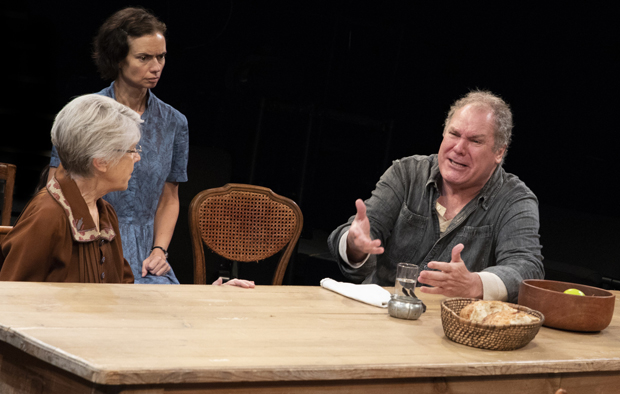The Shortest Uncle Vanya You'll Ever See

(© Joan Marcus)
Three wooden tables are scrunched together, chairs upturned upon them, alongside oriental rugs waiting to be unspooled and cutlery in need of arranging. Small microphones hang like stars from the ceiling. As the lights dim, seven cast members assemble a dining room from the disarray . A song by the Brooklyn indie band Elizabeth and the Catapult serves as underscore. "Someday soon, it's gonna get easier. It's gonna get better. Someday soon."
This opening image is familiar to those accustomed with the recent works of Richard Nelson, a dramatist who turned the minutiae of human life into compelling theatrical cycles titled The Apple Family Plays and The Gabriels. In those plays, which premiered on the specific dates they were set, Nelson captured the uncertainties of the contemporary political zeitgeist as upper-middle-class families watched powerlessly as their lives changed around them.
Chekhov was the clear influence on this series of work, so much so that the Apple quartet was collectively subtitled "Scenes From a Life in the Country," a moniker borrowed from Uncle Vanya. It was only a matter of time before Nelson turned his attention fully toward the Russian master, and there's no play more fitting for his oeuvre than Vanya itself.
Adapted by Nelson and noted Russian literature translators Richard Pevear and Larissa Volokhonsky, this Uncle Vanya is an admirable production to inaugurate Hunter College's Hunter Theater Project and utilizes the distinctly small style that Nelson, as playwright and director, has honed over the past several years. The actors speak in a near whisper and express the unique suffering of these characters in true Chekhovian style, with an elegant balance of vocal and physical anguish, as opposed to actorly pyrotechnics. The audience is simply a fly on the wall.
Middle-aged Ványa (Jay O. Sanders, a vet of both Nelson cycles) and his niece Sónya (Yvonne Woods) have spent their entire lives managing the Russian estate of his late sister, which now belongs to Sónya's father, the sickly, indifferent academic Alexánder Serebryakóv (Jon DeVries, of the Apple Family plays).
Serebryakóv has returned to the estate with his new, significantly younger wife Eléna (Celeste Arias), throwing everyone's normally boring existence into chaos. No one is particularly happy with their lot in life, least of all Ványa, who lusts after Eléna, and Sónya, who pines for the local doctor, Mikhaíl Ástrov (Jesse Pennington). When Serebryakóv announces his plans to sell the estate, Ványa loses his last ounce of patience.
Anguish is ever-present in Sanders's intricately rendered performance, one that silently builds internally and externally to an emotional meltdown that seeps out of every pore in his hulking physique. He's so vividly authentic that you almost want to turn away, except that it's fun to watch him milk every ounce out of Vanya's self-conscious drollness, too.
In terms of verisimilitude, Sanders is matched note-for-note by the rest of the company, particularly the sympathetic Woods, who manages to finds shreds of optimism as Sonya, and Arias, a headstrong and complex Eléna. Pennington is filled with so much ennui regarding his provincial existence that his clothes even seem exasperated (Susan Hilferty and Mark Koss's costumes are contemporary without feeling tied to a particular place and time, as is Jason Ardizzone-West's set). DeVries is a firm, desolate Serebryakóv, with Alice Cannon and Kate Kearney-Patch finding character in the relatively thankless roles of Márya and Marína.
Purists may arch an eyebrow at certain aspects of this production, most noticeably, the abridged text (the whole production clocks in at 110 minutes without intermission). However, Nelson, Pevar, and Volokhonsky have created a lithe, colloquial cutting of Uncle Vanya, with characters that speak like present-day humans. It's the perfect introduction to the text for new audiences, while still capturing the spirit of the original.










